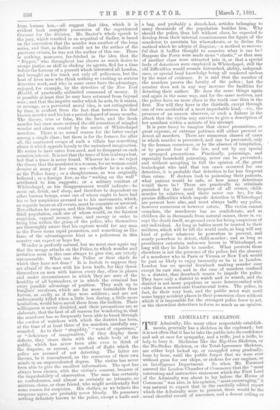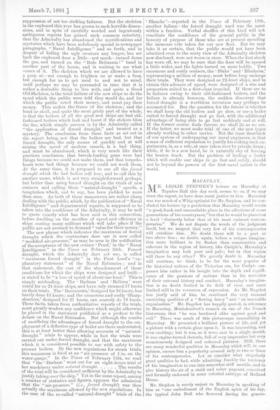THE ADMIRALTY SKELETON. suppression of not too striking failures. But
the skeleton in the cupboard this year has grown to such horrible dimen- sions, and in spite of carefully worded and ingeniously ambiguous reports has gained such common notoriety, that the Admiralty has abandoned the mystifications and mysteries which have been sedulously spread in newspaper paragraphs, " Naval Intelligence " and so forth, and in despair of hiding the ugly creature any longer, has set back the cupboard door a little—not much—turned down the gas, and turned on the " Rule Britannia!" band in another part of the house, and is waiting to see what comes of it. The skeleton which we are allowed to have a peep at—not enough to frighten us or make a fuss, but enough for us to get used to and not to mind, until perhaps we may be persuaded in time that it is rather a desirable thing to live with, and quite a Good Old Skeleton, is the total failure of the new ships to do the speed which the public were told they would do, and for which the public voted their money, and must pay their money. This makes the frame of the skeleton ; and the head or skull, and quite the most grisly part of the whole, is that the boilers of all the good new ships are bad old- fashioned boilers which leak and burst if the stokers blow the fire, which simple process is by the Admiralty called " the application of forced draught," and treated as a i mystery. The conclusion from these facts as set out in the report being, not that the boilers are bad, but that forced draught, the only means of quickly and at will raising the speed of modern vessels, is a bad thing, and must be abandoned, which is very much like their previous conclusion, that breech-loading guns were bad things because we could not make them, and that torpedo- boats were bad things because we could not work them. At the same time, it is proposed to use all the forced draught which the bad boilers will bear, and to call this by another name, which is not very straightforward perhaps, but better than using forced draught on the trials of new cruisers and calling these " natural-draught " speeds, a temptation which, sad to say, has been yielded to more than once. As both of these manoeuvres are rather sharp dealing with the public, which, by the publication of "Naval Intelligence " and departmental reports, is supposed to be taken into the confidence of the Admiralty, it may be well to quote exactly what has been said in this connection, before dwelling on the sacrifice of speed and efficiency in ships costing many millions which will take place if the public are not aroused to demand " value for their money." The new phrase which indicates the maximum of forced draught which the contractors dare use is now called " modified air-pressure," as may be seen in the notification of the acceptance of the new cruiser Pearl,' in the " Naval Intelligence " in the Times on February 24th. Forced draught, which the Admiralty dare not use, is called " maximum forced draught " in the First Lord's " ex- planatory statement" of the Naval Estimates ; and in that statement, the cost of the abandonment of those conditions for which the ships were designed and built— is stated to be " a loss of speed of about one knot." This is simply misleading. The Barham' and Bellona ' were voted for as 21-knot ships, and have only steamed 17 knots on their trials. The Barracouta,' designed for 16 knots, has barely done 13 knots ; and the numerous and costly 'Sharp- shooters,' designed for 21 knots, can scarcely do 18 knots. These facts, taken from authoritative reports of the trials, must greatly weaken any confidence which might otherwise be placed in the statement published as a preface to the debate on the Naval Estimates. But although the results of sacrificing the advantages of forced draught to the em- ployment of a defective type of boiler are there understated, this is at least better than allowing accounts of "natural- draught " trials to appear, while in fact the trials were carried out under forced draught, and that the maximum which it is considered possible to use with safety to the present boilers. By the new regulations for steam trials, this maximum is fixed at an " air-pressure of 1 in. on the water-gauge." In the Tones of February 18th, we read that " the Barham ' went out for an eight-hours trial of her machinery under natural draught. . • . The results of the trial will be considered sufficient by the Admiralty to justify taking over the ship." Yet in the same report, among a number of statistics and figures, appears the admission that the " air-pressure " (i.e., forced draught) was then actually the maximum allowed by the new regulations. In the case of the so-called "natural-draught" trials of the Blanche '—reported in the Times of February 19th, another failure—the forced draught used was the same within a fraction. Verbal shuffles of this kind will not conciliate the confidence of the general public in the honesty of purpose of those who are at present spending the immense vote taken for our new fleet. But we may take it as certain, that the public would not have been admitted even to the misty view of the Admiralty skeleton now disclosed, were not worse in store. When the first shock has worn off, we may be sure that the door will be opened a little wider, and the lights turned on more boldly. Two enormous and costly cruisers, the ' Blake' and Blenheim,' representing a million of money, must before long undergo their trials. They were designed as 22-knot ships, and to obtain this advance of speed, were designed of a size and proportion suited to a first-class ironclad. If these are to be failures owing to their old-fashioned boilers, and the failure is already foreseen, the sudden discovery that forced draught is a worthless invention may perhaps be accounted for. But the question for the future is whether we shall keep the old boilers and go slow, or use a boiler suited to forced draught and go fast, with the additional advantage of being able to go fast suddenly and at will. If the former course finds favour, we shall do as we are. If the latter, we must make trial of one of the new types- already working in other navies. Not the least drawback of our system of underpaying our naval engineers, is that a man of sufficient reputation to justify his risking such ex- periments, is, as a rule, at once taken over by private firms ; while, if he is a new hand, he is naturally shy of leaving the beaten track. But the problem of finding a boiler which will enable our ships to go fast and safely, should. not be beyond the powers of the first naval nation in the world.







































 Previous page
Previous page